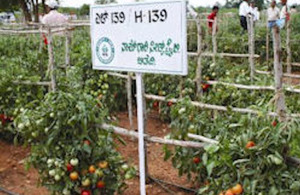DFID Research: Protecting farms from costly whiteflies
Vital research is helping to protect essential crops from damage and diseases caused by whiteflies

Crop breeding for virus resistance has been essential. Picture: CIAT
An ambitious global R&D programme to combat tropical whitefly and the diseases it carries has prevented widespread losses in many essential crops.
Tropical whitefly is one of the world’s most serious agricultural pests. Feeding damage causes severe economic losses in a wide range of food crops grown by millions of smallholder farmers. However, it is the transmission of viruses by whiteflies that has the widest impact on global food production, including on key crops such as cassava, tomatoes, beans and sweet potatoes.
The Tropical Whitefly Project has fostered collaboration amongst a range of partners, including several CGIAR centres, universities, national governments and the private sector to develop and share highly effective Integrated Pest Management practices. Regionally-specific responses have been advanced in 31 countries, utilising new resistant varieties of crops and more rational pesticide use to keep the whitefly and its diseases under control.
Read the full version of this case study.